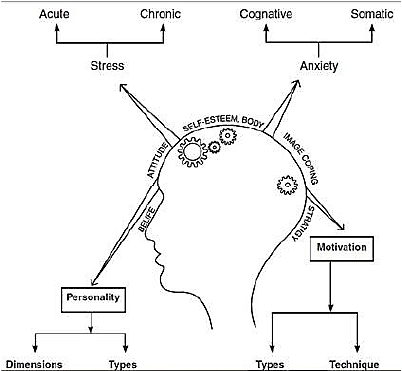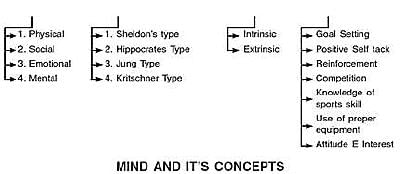Key Points:
- Understanding stress, anxiety and its management.
- Coping strategies.
- Personality, its dimensions and types; Rule of sports in personality.
- Motivation, its type and technique.
- Self-esteem and body image.
- Psychological benefits of exercise.
Psychology
The word psychology is derived from the Greek word ‘psyche’ and ‘logos’. ‘Psyche’ - soul or mind’ and ‘logos - study’. Generally, it is accepted as study of behavior.
- psychology is used in sport to enhance performance and to know the factors which affect our performance, like - anxiety, stress, personality, motivation, etc.
- Optimum level of anxiety is essential to perform in games and sports.
Sports psychology and its importance in the field of sports.
Sports psychology is the branch of applied psychology which deals with sports performance and the Behavior of a player during training or competitions.
Importance of Sports psychology is due to
(i) Learning of Motor Skills Sports psychology plays a major role in the learning of motor skills. Motor skills learning depends on the individual's level of readiness.
(ii) Analyzing the Behavior of Sportsmen Performance of a player depends upon the behaviors which are influenced by various factors such as sex differences, family conditions, personal background, heredity, growth, physical and mental maturity levels etc.
(iii) Identifying Talent for Specific Sports Every sport has specific psychological demands. e. g boxing requires more aggressiveness, whereas archery and shooting require more concentration.
(iv) Stabilizing the Performance for Longer Period It helps in stabilizing the performance of a player for a longer period. Then the performance of the player largely depends upon his psychological makeup and anxiety level.
(V) Important from Research Point of View Sports psychologists work in very close proximity to coaches to uplift the performance of players. Research findings help in the promotion of sports and games.
(vi) Encouraging the Players to Make a Comeback in Professional Sports Sports psychology encourages the players, who, due to injury or an accident, are forced to take a long break from their professional career, to return to their sport.
Stress and its management techniques.
A state of affairs involving demand on physical or mental energy. The body‘s physiological response to demands placed on it. In simple words, stress is a condition or circumstance which can disturb the normal physical and mental health of a person.
Stress is nothing but response of body to an event or situation which are produced by physiological and psychological changes in the body stress is a body’s method to reach a challenge. It is fight or flight reaction.
Coping up is a technique which tells us how to handle anxiety or stress.
Techniques to manage Stress:-
a) Participation in Physical activities,
b) Achieve a high level of physical fitness,
c) Building self-confidence,
d) Relaxation techniques
e) Developing Hobbies
f) Staying cool and confident under pressure
g) Avoid the company of stressed persons
h) Don‘t think about stressful thoughts
Anxiety and its management
Anxiety:- Anxiety is a psychological and physiological state of an individual. It is characterized by cognitive, emotional and behavioral components. These components combine to create an unpleasant feeling, which is associated with uneasiness, fear or worry.
According to Levitt:- Anxiety is a personal feeling of apprehension accompanied by an increased level of physiological arousals.
―Anxiety is a chronic fear that limits our ability to carry out normal functions.
Anxiety (also called angst or worry) is a psychological and physiological state characterized by somatic, emotional, cognitive, and behavioral components. It is the displeasing feeling of fear and concern. The root meaning of the word anxiety is 'to vex or trouble'; in either presence or absence of psychological stress, anxiety can create feelings of fear, worry, uneasiness, and dread.
Anxiety in sports is a natural reaction to threat in environment & part preparation of fight response. It is a psychological phenomenon.
Management of Anxiety:- Anxiety can be managed through various techniques such as
(i) Deep breathing
(ii) Drink water
(iii) Follow advice
(iv) Psychological balance
(v) Warming-up
(vi) No criticism
(vii) Focus your target
(viii) Sufficient practice
(ix) Self-confidence
(x) Encouragement,
Personality its traits and types
Personality is the dynamic organization within the individual of those psychophysical systems that determine his unique adjustment to his environment. Personality is not static but a dynamic concept. It is continuously changing and growing. Children may have identical environment. They may have similar experiences but they react to the same environment in different ways.
Personality is a very important factor in games and sports as it influences the performance of individual by his/her level of cognition, motivation, traits and behaviour.
Types of Personality Introverts:- Introverts are shy, self-conscious quit retiring interested in their own thoughts and feelings, inclined to worry and easily upset.
Extroverts:- Extroverts are social, open frank, outgoing, eager to do things adaptable, not easily worried or embarrassed and willing to work with others.
Ambiverts:- In ambiverts both the characteristics of introverts and extroverts are found. In every person mostly both the characteristics are found through one of them may be predominant. Sports play a very important role in personality development. They improve the following qualities.
(a) Self-concept
(b) Mental toughness
(c) Emotional stability
(d) Quick Decision
(e) Planning (Points to be explained)
Sports and games play an important role in the development of human personality. They are no less important than food and fresh water. Games and sports help to combat anxiety, depression and stress. Sports train sportsmen to accept defeat gracefully and to move on.
Traits of personality
Openness:- persons who like to learn new things, new concepts and enjoy new experiences usually remain on the top in openness. It includes traits like being imaginative, insightful, and having a variety of interests.
a) Conscientiousness: Persons who have a high degree of conscientiousness are reliable and prompt. Such persons remain organized, systematic, laborious and complete in all respects.
b) Extroversion: Extroverts get their energy from interacting with other individuals whereas introverts get their energy from within themselves. Extroversion includes the traits of being energetic, talkative and assertive.
c) Agreeableness: Such individuals are friendly, cooperative, compatible, kind and gentle. Persons with to agreeableness may be more distant or aloof. They are usually kind, generous, affectionate and sympathetic.
d) Neuroticism: Neuroticism is also called emotional stability. This domain or dimension relates to one’s emotional stability and the degree of negative emotions. Persons who have high neuroticism usually experience emotional instability and negative emotions. Such individuals remain moody and tense.
Sheldon’s classification of personality.
Endomorph: Endomorphs have a pear-shaped and a rounded physique. They have short arms and legs. The upper parts of arms and legs seem to be thicker than the lower parts. They have underdeveloped muscles. They are more inclined to become obese. Their excessive mass hinders their ability to compete in sports. These are most suitable for activities in which great strength is required.
Mesomorph: Mesomorphs have a rectangular shaped body with athletic physiques and balanced body composition. They are able to increase their muscles size quickly and easily. They have thick bones and muscles. Their chest and shoulders are broader than the waistline. They can excel in sports which require great strength, short bursts of energy and lots of power because they have enough strength, agility and speed.
Ectomorphs: Ectomorphs are usually referred to as slim persons because their muscles and limbs are elongated. They have weak constitution of busy and face great difficulty in gaining weight. They have a flat chest and have less muscle mass. They do not have a lot of strength but they dominate the endurance sports as their busy type is naturally suited to perform wonderfully in endurance sports. They are best suited for games and sports like gymnastics and long-distance races.
Motivation and its types
Motivation means to be inspired to do something. It is a kind of inner force which energizes a man to make constant efforts.
According to Crook and Stein, "Motivation is any condition that might energies and directs our action.
Motivation energizes an individual to behave in a particular way to attaining a specific goal.
Types of Motivation
There are two types of motivation
(i)Intrinsic Motivation is within an individual and guides him/her to perform better. It is based upon needs, interests, nature, emotions, social needs etc. It also depends upon knowledge of result, personal factor, competition zeal etc. He/she participates in sports for his/her own sake.
(ii) Extrinsic Motivation This motivation depends on environmental factors. It has a great impact on an individual's performance. It is of various types like rewards, punishment, active participation, test evaluation, teaching methods, equipment and surroundings
(i) Healthy Sports Environment A healthy sports environment plays a vital role in motivating the sportsperson. Healthy sports environment consists of proper humidity and temperature, smooth and clean sports fields, good quality of sports equipment and other facilities. Positive Attitude For proper motivation, the coaches should try to encourage positive attitude among sportspersons. Players must think positively.
(ii) Cash Prizes, Certificates and Trophies These are good incentives to sportspersons. Governments offer cash prizes to sportspersons who win.
Self Esteem
What we think about the self, the total evaluation of negative or positive about oneself is called self-esteem
Body Image
Body image is how and what you think and feel about your body.
Factors influencing body image and self-esteem
i) Media Images:- During teenage, teenagers become more aware of celebrities and media images. They usually start to compare themselves with media images and celebrities.
ii) Family and school:- We do not develop our body image all on our own. The family, school and other members of society can influence our self-esteem and body image.
iii) Life experience and natural aging process:- Body image and self-esteem are also significant factors which influence the body image influence our body image and self-esteem.
Types of aggression Hostile aggression: Hostile aggression is inflicting or causing harm whether it is physical or psychological effect on someone else. It is sometimes referred to as reactive aggression and can be accompanied by anger. In hostile aggression, the main aim is to cause injury to another person.
The intention is on causing pain and suffering.
Instrumental aggression: Instrumental aggression is displaying aggressive behavior in pursuit of a non-aggressive goal. It is also known as channeled aggression is not accompanied by anger. Instrumental aggression is behaviour that has intent to hurt in order to achieve money, praise or victory.
Assertive behavior: Assertive behavior is different type of aggression/aggressive behavior. This is defined as behavior that involves the use of legitimate physical or verbal force to achieve one’s purpose. In Assertive behavior, the intention is to establish dominance rather than to harm the opponent.


























